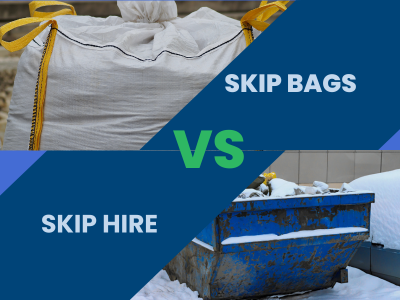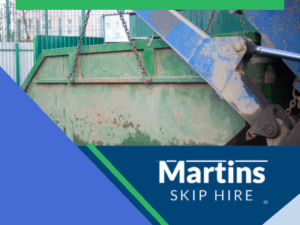If you’re planning a clear-out, home renovation or garden project, you’ll probably find yourself deciding between skip bags and traditional skips. Both are used for waste removal, but they’re very different in practice. Skip bags are often solid as a cheap and flexible alternative, but they come with limitations that aren’t always obvious upfront.
In most cases, hiring a skip offers better value, more capacity, and a far smoother process. Here’s how they really compare.
Is It Cheaper to Use a Skip or a Skip Bag?
Skip bags are typically cheaper to buy at the start. You can pick one up from a DIY shop and fill it in your own time. The problem comes when it’s time for collection. Most skip bags have strict weight limits, item restrictions, and postcode-specific collection charges. If your waste exceeds the guidelines or includes anything prohibited, you’ll be hit with extra costs or refused pickup altogether.
With skip hire, the price you see is the price you pay. Delivery, collection, and disposal are all included. You can load heavy waste, bulky items and mixed materials without worrying about whether it’s allowed. When you add up what it actually costs to fill and remove a skip bag properly, a traditional skip is often the cheaper option.
Are Skip Bags Cheaper than Skips?
They can be cheaper for very small, lightweight loads, but the savings are usually marginal and short-lived. If you underestimate how much waste you have, you’ll likely need to buy a second bag or face weight surcharges. Most people also don’t realise that skip bags aren’t always collected promptly, especially in rural areas or places with limited access.
Skips don’t have these problems. Once it’s delivered, you’ve got a fixed-size container on-site with a guaranteed collection time. There are no last-minute surprises or hidden fees, and skips are far better suited to anything beyond basic household rubbish. For most domestic and commercial jobs, skips are not just more practical, they’re better value too.
How big is a 2-yard skip?
A 2-yard skip is one of the smallest sizes available, but it still holds a surprising amount. It can take around 20 to 30 bin bags of waste, which is more than double what most skip bags can handle. It’s compact enough to fit on a driveway or small frontage, making it ideal for garden cleanups, DIY waste or general clutter.
Crucially, it’s built to handle more weight. A 2-yard skip can take soil, rubble, tiles, and timber without any issue. Skip bags, on the other hand, are often limited to soft, light materials and can tear or sag when overloaded.
What can I fit in a 4-yard skip?
A 4-yard skip can handle around 30 to 40 bin bags worth of waste. This makes it ideal for bathroom renovations, kitchen rip-outs, small building projects, or general home clearances. You can fill it with plasterboard, tiles, old furniture, wood, or a mix of heavy and bulky materials.
Skip bags simply aren’t built for this type of load. They often can’t take plasterboard, and many providers won’t accept them if they contain heavy building waste. Even when accepted, the collection can be delayed or refused if the bag is too full. With a 4-yard skip, you know exactly how much space you have and what it can take. There is no guessing, no weighing, and no risk of being left with waste on your driveway.
Which is better for your waste?
Skip bags work for small, soft, low-volume waste loads where collection timing isn’t critical. But for anything else, especially when weight, bulk, and reliability matter, hiring a skip is the better choice. Skips offer greater capacity, clearer pricing, and a faster, more professional service.
If you need waste cleared quickly, safely, and without surprises, a Martin’s skip hire gives you the control and convenience you won’t get with a bag. If you’re ready to book your skip at the best local rates near you, call us directly on 03300 948 167. Our expert skip hire team is always happy to assist with your waste requirements.
 sales@martinskiphire.co.uk
sales@martinskiphire.co.uk 




